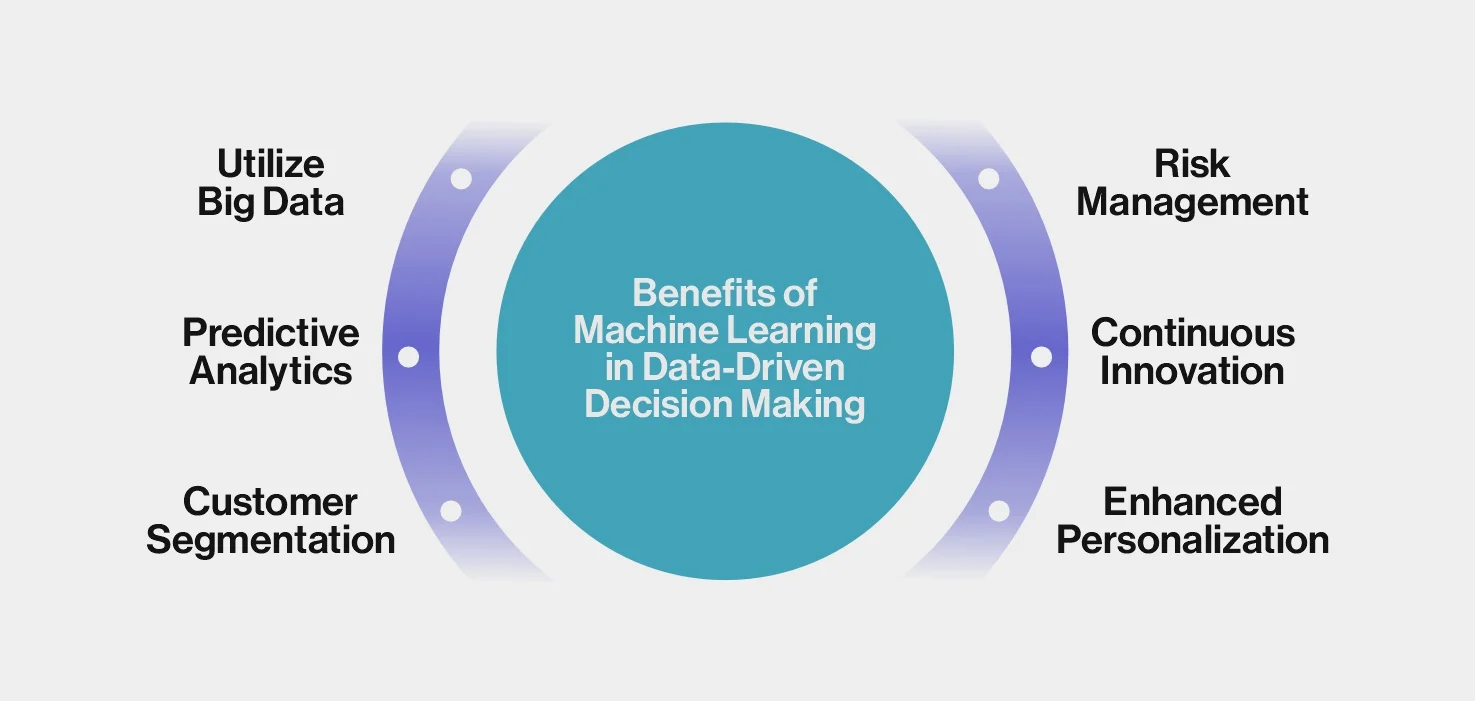By 2024, nobody will call data-driven decision making an obscure startup concept. It will be a business necessity. Whether you’re at the concept phase or just ready to launch, every decision can make, or break your business. However, what if you could make those choices with confidence as informed by data and quantitative analysis? One can only dream of being able to anticipate the startup’s future performance. Just think about the possibility to predict such things as operational problems, customers’ actions, and market trends in general. You are perpetually on the lookout for how to gain competitive insights with your competitors and grow your business smarter as a decision-maker in startups. The key is to use machine learning's power. According to Statista, the global big data market will rise to $103 billion by 2027. In this blog post we’ll discuss how startups can use machine learning to make data-driven decision making.
What Is Data-Driven Decision Making?
Data driven decision making (DDDM) is a systemic approach. It refers to the process where information relevant to decision making is collected and used. The analyses of the operational data, customer data, market data and other external sources becomes inevitable to reason and make effective decisions. By making decisions on factual data, startups can avoid additional risks, work more efficiently, and attain better results.
The Data-Driven Decision-Making process consists of the following steps:
Key Takeaways
1. Data Collection:
Integrating data from various sources, such as customer service, external data providers, and internal systems.
2. Data Processing:
The raw data acquired from various sources are then preprocessed and integrated and then matched to common standards and format.
3. Data Analysis:
Techniques like machine learning, data mining and statistical analysis are used to determine the pattern, information, and trends within the given data set.
4. Data Visualization:
Utilizing tools like flowcharts, reports, and interactive forms to present data and findings in a clear and understandable manner.
5. Decision-Making:
The process of identifying, measuring, analysing and synthesizing data to provide insight for a range of strategic and/or operational decision making purposes.
6. Monitoring and Evaluation:
Continuously monitoring and evaluating the effectiveness of data-driven decisions for further improvements and changes.
Leveraging Machine Learning in Startups
Machine learning tools are capable of providing the startups to enhance their data analytics. With the help of artificial intelligence tools, startups can make better and accurate decisions as they are able to work through the vast data, and both see patterns and make forecasts. Platforms like Google AI or Amazon SageMaker can be used by startups to:
- Discover new opportunities by utilizing massive amounts of information about customers.
- Learn what is coming next in demand, customer behavior or changes in your market through supply chain analysis.
- Introduce an artificial intelligence-based chatbot that will help to improve the user experience.
Machine learning helps startups move away from simple descriptive analysis and get deeper prescriptive and predictive results. It holds them in a position of being able to meet the expectations of customers while improving the overall functioning as well as keeping a strong and competitive position.
Common Startup Challenges Addressed by Machine Learning
Let's explore how machine learning can solve critical startup challenges:
Acquisition and Retention of Customers:
Marketing efforts can be personalized and high-value customer segments can be identified with predictive modeling. Some of the successful methods of customer retention can be derived from predictive analytics to recognize customer loss risks.
Financing:
Based on historical data and market trends, both financial performance and costs as well as revenue can be estimated with the help of machine learning models.
Inventory Management:
In predictive methods, equipment failure is not hard to predict, and thereby the amount of time the equipment is out of order is minimized, and service levels can also be boosted.
Benefits of Machine Learning in Data-Driven Decision Making

1. Utilize Big Data
Machine learning have made big data analysis possible in previously unimaginable ways. Real-time data collection, analysis, and interpretation are now available to startup businesses. They are able to acquire more in-depth information about customers, their behavior, the market, and even internal operations. Because of this, big data makes it possible for businesses to discover brand-new patterns and connections that are difficult to comprehend using more conventional approaches.
2. Predictive Analytics
The capabilities of predictive analytics make it advantageous to employ machine learning for decision-making purposes. By looking at data from the past, these methods help predict trends and outcomes in the future. Customer expectations and requirements, as well as potential risks, can be the focus of predictive analytics. It assists associations with foreseeing, expect or forestall future occasions, advance asset use and change methodologies likewise.
3. Customer Segmentation
Machine learning processes big data to uncover significant data about clients, their activities and inclinations. Startups are able to develop marketing communications messages and products tailored to specific segments of their customer base. In a competitive market, effective strategies for increasing customer satisfaction and brand loyalty include customer segmentation and targeting.
4. Risk Management
Machine learning is used in fraud detection systems to find potential leaks and reduce losses. Improves risk management through data analysis in the process of mitigating risks or threats.
5. Continuous Innovation
Continuous innovation relies heavily on machine learning. Utilization of technology also leads to improvements in collection, analysis, recognition, and automation capabilities over time. Business adaptability and the capacity to deal with emerging market trends both benefit from this.
6. Enhanced Personalization
Understanding consumer needs and behavior helps organizations create products, and services that appeal to their target audience. This results in increased revenue because it boosts customer satisfaction and retention. Machine learning improves these recommendations making them more realistic and actionable.
Importance of Data-Driven Decision-Making for Startups
For startups, data driven decision making is something brighter than a mere bandwagon. It is the key to success in an uncertain business climate due to the fact that quick and accurate decisions can make or break any startup’s operations. McKinsey report reveals that firms that follow data driven decision making approaches are 23 times more likely to achieve and overcome hurdles. Furthermore, they are six times more likely to retain customers and nineteen times as profitable.
Startups can use DDDM to track trends, comprehend how customers behave, enhance operations, and ultimately drive growth. Startups can use it to confidently navigate the complex business landscape and reduce the risk of making decisions based on instinct. Airbnb is one of the most successful organisations which use the DDDM to successfully expand its business throughout the world. It started in 2008 and is expected to reach more than $100 billion by 2024.
How to Decide on the Right Machine Learning Model for Your Startup?
Selecting the appropriate machine learning model for a startup is an important decision which determines whether your insights are going to perform effectively. One will find that there are a number of these kinds of models for machine learning, and each of them has its benefits and drawbacks. Numerous factors influence the choice of a model: the nature of your data, the problem you are trying to address, the computational resources available and how interpretable you need your model to be. It takes a lot of iterations to find the right machine learning model. It requires striking a balance between business objectives and technical considerations, so it's often best to start slowly and adjust your models as your startup grows.
Conclusion
Early-stage startups can gain a significant competitive advantage in dara driven decision making by utilizing machine learning. Startups will be able to make decisions based on data, increase product sales, and develop novel products that truly resonate with your target audience.
Are you prepared to begin your journey into data driven journey? FiveRivers Technologies helps startups make data-driven decisions by using machine learning to analyze data, uncover valuable insights, and develop customized AI solutions tailored to business goals.

